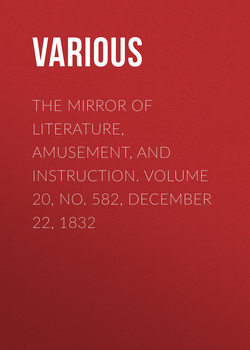Читать книгу The Mirror of Literature, Amusement, and Instruction. Volume 20, No. 582, December 22, 1832 - Various - Страница 2
MANNERS AND CUSTOMS
ОглавлениеANCIENT AND MODERN CHRISTMAS
"Anciently there was in the king's house," says Stow, "wheresoever he lodged, at the feast of Christmas, a 'Lord of Misrule, or Master of Merry Disports;' and the like also was there in the house of every nobleman of honour or good worship, whether spiritual or temporal. Among these, the Mayor and Sheriffs of London had their several Lords of Misrule, ever contending, without quarrel or offence, who should make the rarest pastime to divert the beholders. These Lords began their rule, or rather misrule, on All Hallow's-eve, and continued the same until Candlemas-day, in which space there were fine and subtle disguisings, masques, and mummeries, with playing at cards for counters, nails, and points, in every house, more for pastime than for gain. Against this feast, the parish churches and every man's house were decked with holm, ivy, bay, and whatsoever the season of the year afforded that was green; and the conduits and standards in the streets were likewise garnished."
W.G.C
Kent
At Ramsgate they commence their Christmas festivities by the following ceremony:—A party of the youthful portion of the community having procured the head of a horse, it is affixed to a pole, about four feet in length; a string is attached to the lower jaw, a horse-cloth is tied round the extreme part of the head, beneath which one of the party is concealed, who, by repeated pulling and loosening the string, causes the jaw to rise and fall, and thus produces, by bringing the teeth in contact, a snapping noise, as he moves along; the rest of the party following in procession, grotesquely habited, and ringing hand-bells! In this order they proceed from house to house, singing carols and ringing their bells, and are generally remunerated for the amusement they occasion by a largess of money, or beer and cake. This ceremony is called "a hoodening." The figure which we have described is designated "a hooden," or wooden horse. The ceremony prevails in many parts of the Isle of Thanet, and may probably be traced as the relic of some religious ceremony practised in the early ages by our Saxon ancestors.
Norfolk
The following account of a pageant which took place at Christmas, 1440, is from the records of Norwich:—"John Hadman, a wealthy citizen, made disport with his neighbours and friends, and was crowned King of Christmas. He rode in state through the city, dressed forth in silks and tinsel, and preceded by twelve persons habited as the twelve months of the year, their costumes varying to represent the different seasons of the year. Alter King Christmas followed Lent, clothed in white garments trimmed with herring skins, on horseback, the horse being decorated with trappings of oyster-shells, being indicative that sadness and a holy time should follow Christmas revelling. In this way they rode through the city, accompanied by numbers in various grotesque dresses, making disport and merriment,—some clothed in armour, carrying staves, and occasionally engaging in martial combat; others, dressed as devils, chased the people, and sorely affrighted the women and children; others, wearing skin-dresses, and counterfeiting bears, wolves, lions, and other animals, and endeavouring to imitate the animals they represented, in roaring and raving, alarming the cowardly and appalling the stoutest hearts."
Dalmatia
At Selenico, in Dalmatia, according to Fortis; they elect a king at Christmas, whose reign lasts only a fortnight; but notwithstanding the short duration of his authority, he enjoys several prerogatives of sovereignty: such, for example, as that of keeping the keys of the town, of having a distinguished place in the cathedral, and of deciding upon all the difficulties or disputes which arise among those who compose his court. The town is obliged to provide him with a house suitable to the dignity of his elevated situation. When he leaves his house, he is always compelled to wear a crown of wheat-ears, and he cannot appear in public without a robe of purple or scarlet cloth, and surrounded by a great number of officers. The governor, the bishops, and other dignitaries, are obliged to give him a feast; and all who meet him must salute him with respect. When the fortnight is at an end, the king quits his palace, strips off his crown and purple, dismisses his court, and returns to his hovel. For a length of time this pantomimical king was chosen from amongst the nobles, but at present it has devolved on the lowest of the people.
